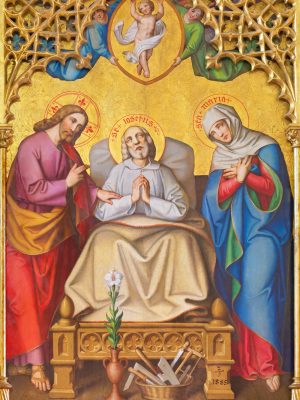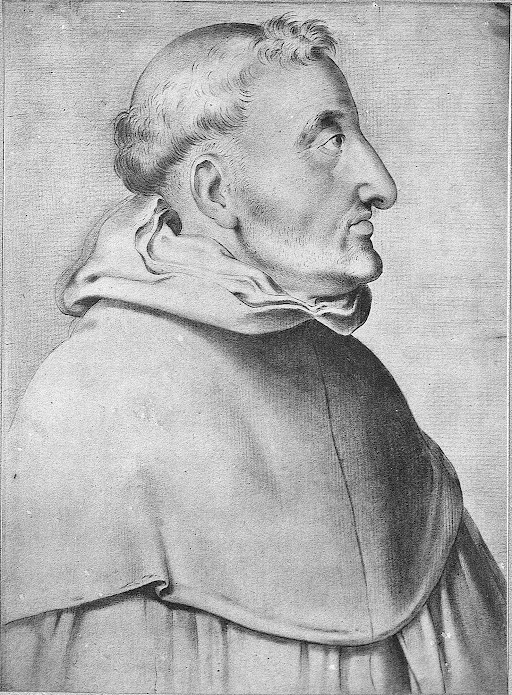The end, it is said, crowns the work, and, therefore, it is in death that the just man’s life is most fittingly crowned, while the departure of the sinner is a no less fitting close to his wretched career.
“Precious in the sight of the Lord is the death of his saints” (Ps. 115:15), says the Psalmist, but “the death of the wicked is very evil” (Ps. 33:22).
Commenting upon the latter part of this text, St. Bernard says:
“The death of the wicked is bad because it takes them from this world: it is still worse because it separates the soul from the body; and it is worst because it precipitates them into the fire of Hell, and delivers them a prey to the undying worm of remorse.”
To these evils which haunt the sinner at the hour of death add the bitter regrets which gnaw his heart, the anguish which fills his soul, and the torments which rack his body.
He is seized with terror at the thought of the past; of the account he must render; of the sentence which is to be pronounced against him; of the horrors of the tomb; of separation from wife, children, and friends; of bidding farewell to the things he has loved with an inordinate and a guilty love – wealth, luxuries, and even the gifts of nature, the light of day and the pure air of heaven.
The stronger his love for earthly things has been, the bitterer will be his anguish in separating from them. As St. Augustine says, we cannot part without grief from that which we have possessed with love. It was in the same spirit that a certain philosopher said that he who had fewest pleasures in life has least reason to fear death.
But the greatest suffering of the wicked at the hour of death comes from the stings of remorse, and the thought of the terrible future upon which they are about to enter.
The approach of death seems to open man’s eyes and make him see all things as he never saw them before.
“As life ebbs away,” says St. Eusebius, “man is free from all distracting care for the necessities of life. He ceases to desire honors, emoluments, or dignities, for he sees that they are beyond his grasp. Eternal interests and thoughts of God’s justice demand all his attention. The past with its pleasures is gone; the present with its opportunities is rapidly gliding away; all that remains to him is the future, with the dismal prospect of his many sins waiting to accuse him before the judgment seat of the just God.”
“Consider,” the saint again says, “the terror which will seize the negligent soul when she is entering eternity; the anguish with which she will be filled when, foremost among her accusers, her conscience will appear with its innumerable retinue of sins.
Its testimony cannot be denied; its accusations will leave her mute and helpless; there will be no need to seek further witnesses, for the knowledge of this lifelong companion will confound her.”
Still more terrible is the picture of the death of the sinner given by St. Peter Damian:
“Let us try to represent to ourselves,” he says,”the terror which fills the soul of the sinner at the hour of death and the bitter reproaches with which conscience assails him.”
The commandments he has despised and the sins he has committed appear before him to haunt him by their presence.
He sighs for the time which he has squandered, and which was given to him to do penance; he beholds with despair the account he must render before the dread tribunal of God. He longs to arrest the moments, but they speed relentlessly on, bearing him nearer and nearer to his doom.
If he looks back, his life seems but a moment, and before him is the limitless horizon of eternity. He weeps bitterly at the thought of the unspeakable happiness which he has sacrificed for the fleeting pleasures of the flesh.
Confusion and shame overwhelm him when he sees he has forfeited a glorious place among the angelic choirs, through love for his body, which is about to become the food of worms.
When he turns his eyes from the abode of these beings of light to the dark valley of this world, he sees how base and unworthy the things for which he has rejected immortal glory and happiness.
Oh! Could he but regain a small portion of the time he has lost, what austerities, what mortifications he would practice! What is there that could overcome his courage?
What vows would he not offer, and how fervent would be his prayers! But while he is revolving these sad thoughts, the messengers of death appear in the rigid limbs, the dark and hollow eyes, the heaving breast, the foaming lips, and the livid face.
And as these exterior heralds approach, every thought, word, and action of his guilty life appears before him.
“Vainly does he strive to turn his eyes from them; they will not be banished. On one side – and this is true of every man’s death – Satan and his legions are present, tempting the dying man, in the hope of seizing his soul even at the last minute. On the other side are the angels of Heaven, helping, consoling, and strengthening him. And yet it is his own life what will decide the contest between the spirits of darkness and the angels of light. But the impious man, whose unexpiated crimes are crying for vengeance, rejects the help that is offered to him, yields to despair, and as his unhappy soul passes from his pampered body, the demons are ready to seize it and bear it away.”
What stronger proof does man require of the wretched condition of the sinner, and what more does he need to make him avoid a career which ends so deplorably?
If, at this critical hour, riches could help him as they do at many other periods of life, the evil would be less.
But he will receive no succor from his riches, his honors, his dignities, his distinguished friends. The only patronage which will then avail him will be that of virtue and innocence.
“Riches,” says the Wise Man, “shall not profit in the day of revenge, but justice shall deliver from death” (Prov. 11:4).
As the wicked, therefore, receive at the our of death the punishment of their crimes, so do the just then receive the reward of their virtues.
“With him that feareth the Lord,” says the Holy Spirit, “it shall go well in the latter end; and in the day of his death he shall be blessed” (Ecclus. 1:13). St. John declares this truth still more forcefully when he tells us that he heard a voice from Heaven commanding him, “Write: Blessed are the dead who die in the Lord. From henceforth, saith the Spirit, they rest from their labors, for their works follow them” (Apoc. 14:13).
With such a promise from God Himself, how can the just man fear? Can he dread that hour in which he is to receive the reward of his life’s labors?
This article is taken from a chapter in The Sinner’s Guide by Ven. Louis of Granada which is available from TAN Books.









